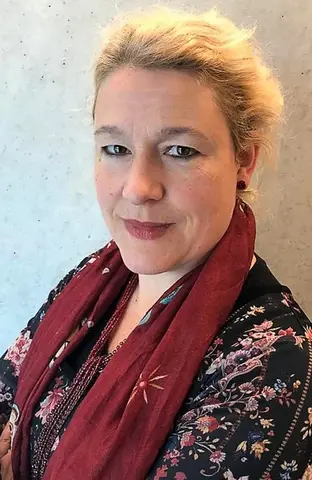Wissenschaftliche Mitarbeiterin an der Professur für Allgemeine Religionswissenschaft (Seminar für Religionswissenschaft)
Office hours
donnerstags 11-12:30 Uhr,
in der vorlesungsfreien Zeit nach Vereinbarung per E-Mail
Visiting address
Universität Erfurt
Alfred-Weber-Platz 4
99089 Erfurt
Mailing address
Universität Erfurt
Philosophische Fakultät
Allgemeine Religionswissenschaft
Postfach 90 02 21
99105 Erfurt
Fakultätsgleichstellungsbeauftragte der Philosophischen Fakultät (Equal Opportunity Office)
Visiting address
Universität Erfurt
Alfred-Weber-Platz 4
99089 Erfurt
Mailing address
Universität Erfurt
Philosophische Fakultät
Allgemeine Religionswissenschaft
Postfach 90 02 21
99105 Erfurt
Mitglied, Fachrichtung "Allgemeine Religionswissenschaft" (Erfurter RaumZeit-Forschung)
Mailing address
Universität Erfurt
Philosophische Fakultät
Forschungseinheit "Erfurter RaumZeit-Forschung"
Postfach 90 02 21
99105 Erfurt
Fellow (Max Weber Centre for Advanced Cultural and Social Studies)
Visiting address
Universität Erfurt
Alfred-Weber-Platz 4
99089 Erfurt
Raum C18.00.15
Mailing address
Universität Erfurt
Max-Weber-Kolleg für kultur- und sozialwissenschaftliche Studien
Postfach 90 02 21
99105 Erfurt

Personal Information
PD Dr. Isabella Schwaderer is a lecturer in the Department of Religious Studies at the University of Erfurt, Germany. She received her MA in Ancient Greek from the University of Würzburg and her PhD in Religious Studies (Orthodox Christianity) from the University of Erfurt. Her teaching and research focus on the intersections of religion and modernity, as well as religion and art, with a particular emphasis on dance in South Asia. Her recent publications include: Religious Entanglements Between Germans and Indians, 1800–1945 (2023, co-edited with Gerdien Jonker) and “Exotic Sensation” or “Völkisch Art”? Press Reviews of the Indisches Ballett Menaka (Menaka Indian Ballet) on Tour Through Germany, 1936–1938" (NTM, 2023).
Research Project
Staging religion: Performative Aspects of the Religious on Theater Stages between Germany and South Asia 1900-1938
Theater, as a vital urban institution in the late 19th and early 20th centuries, not only entertained but also engaged with religious themes and social issues, offering city dwellers a space to participate in broader debates and conflicts. Through its performative nature and the embodied participation of actors, dancers, and audiences, theater served as a medium for reimagining and reinterpreting religion in diverse urban contexts.
One compelling example is the Indian Ballet Menaka, which toured Germany, Europe, and South Asia from the late 1920s and the 1940s, exemplifying the intersection of religion, modernity, and cultural exchange on the theater stage. Menaka's performances showcased how theater became a space for exploring the dynamic interplay between tradition and innovation, reflecting globalized modernism and its transcultural implications. In a cultural studies approach, the scattered memorabilia from Menaka’s Ballet reveal concepts of multiple modernities and heterogeneous temporalities, highlighting the complexity of transcultural narratives that shaped this period.
The material also brings into focus the ethical-aesthetic and spiritual-racial discourses that surrounded dance and performance in early 20th-century Colonial India and Germany. These discussions illuminate the tensions between modern and anti-modern world-relations, as well as the transition from religion to art as a mode of expression. Analyzing these performances in the context of their time reveals how global religious traditions, the conflict between religion and science, and evolving understandings of religiosity were negotiated (also) in theaters.
A comparative analysis of the reception of performances in Europe and South Asia—while sharing the same content—demonstrates how vastly different contexts elicited distinct responses. These contrasts underscore how theater acted as a medium for examining religious, artistic, and political discourse in unique yet interconnected ways. Moreover, exploring religiosity through the lens of German and Indian theater disrupts Eurocentric frameworks in the social sciences and philosophy, emphasizing the importance of transcultural and interdisciplinary approaches.
